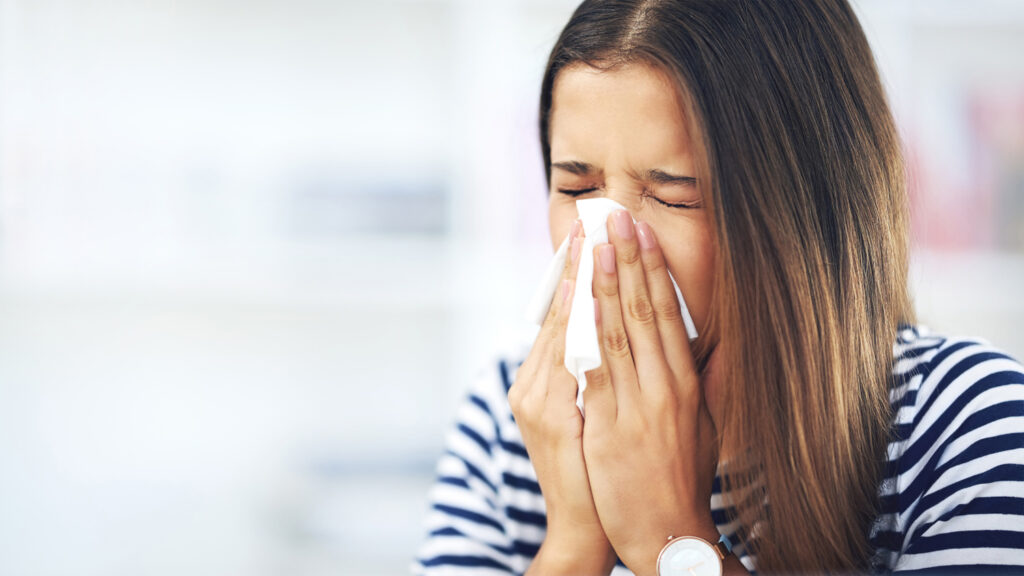Allergies are common in many parts of the world, especially when the seasons are changing. Some areas have higher environmental allergens than other areas and some allergens bother people more than others! For example, if mold is an allergen that is bothersome to you, living in an area of the country with significant dampness, such as the Pacific Northwest, can increase your rate of allergen exposure as the moist environment leads to a higher rate of mold than the dry desert areas of our country.
In other areas of the country, high pollen content can interfere with the ability to breathe clean air easily which irritates your nasal cavities, eyes, and ears. The midwest tends to experience high pollen count amongst the fields of farmers for miles upon miles as well as the lack of large bodies of water to help dissipate the pollen. Increased pollen counts, changes in air pressure following storms, and the growth of new plants can all cause different allergens to spread!
What are the symptoms?
Symptoms for allergies vary from person to person, but it often causes the sinuses to feel clogged and overall pressure in the head and neck region. Aside from our nose, other facial parts can be affected as well including our eyes, throat, and ears. Our nose, throat, and ears are all connected to one another through our Maxillary Sinuses which includes our paranasal cavities and Eustachian tube.
The Eustachian tube is a small canal that drains fluid from the middle ear and nose into the back of the throat. It also helps keep the pressure within our ear balanced with the pressure outside. Think about when you fly in an airplane or go to the top floor of a skyscraper in an elevator.
As you climb higher and higher into the sky, your ears start to feel plugged, and everything sounds muffled. Soon, you will feel a “pop”, meaning your Eustachian tube opens up, and that pressure goes away. When allergies occur and our Eustachian tube cannot function properly, this can have larger effects on our ability to hear sounds around us.
When allergens are in the air, our immune system is responsible for fighting off these foreign bodies and helping us stay healthy. When our immune system detects these allergens, it responds by producing antibodies that travel to the nose, lungs, throat, sinuses, and ears. The problem though, is our body overreacts and produces way too many antibodies. This causes a chemical reaction that overproduces mucus within these areas.
This mucus will start to fill those areas and cause many of the common symptoms associated with allergies: cough, drainage from your nose, and plugged ears. Within our ears specifically, our middle ear is an air-filled cavity that is lined with a light mucus membrane. When the antibodies are present though, this mucus membrane becomes very thick and fills the middle ear space. When the middle ear space is filled with fluid, the eardrum and three ossicles, tiny middle ear bones, cannot move to help pass sound to the inner ear. This increase in fluid is called Otitis Media, which is a middle ear infection.
This infection will cause you to feel “plugged up” in one ear, similar to when you have foam earplugs in your ear. This over-creation of mucus within the middle ear causes what is known as conductive hearing loss. This hearing loss is temporary, meaning that once the mucus is resolved and returns to a normal level, hearing will also be resolved!
What parts of the ear are affected?
Allergies can affect all parts of the ear though, not just the middle ear. Our outer ear, which consists of the pinna, the portion on the outside of our head, and our ear canal can have allergic reactions when the skin comes into contact with something it doesn’t like. Common examples are fragrances from perfumes, laundry detergents, or pets.
These can all cause an allergic skin reaction and make the skin inflamed and sensitive to touch. If the skin becomes swollen, then it could block the ear canal and stop sound waves from entering. Other infections can occur through ear piercings. If a piercing becomes infected, it is important to seek medical attention from an urgent care or an Ear Nose and Throat (ENT) doctor.
They can help remove the piercing and fight off the infection! Infections can also happen within our ear canal. Most of our ear canal is cartilage but the deepest portion is bone. This bone is covered by very thin and sensitive skin, which if scratched can easily tear and create an open wound. Scratches can occur through using Q-tips or sticking other objects in your ear, which we all know we should not do at all! If this wound becomes infected, it can create an outer ear infection known as Otitis Externa. Common symptoms of Otitis Externa include ear pain or swelling, odor from the ear canal, drainage, or bleeding. Otitis Externa can be very dangerous if not treated, therefore if you have any of these symptoms it is important to see an ENT.
The inner ear, cochlear, can also be affected by allergies. Our cochlear is a fluid-filled structure encased by membranes and bones. The cochlea is constantly producing new fluid that is balanced in ions. When the body is responding to allergies and overproducing mucus, it can increase the amount of fluid produced within the cochlea and cause an imbalance between positive and negative ions. It also can increase the amount of fluid pressure on the membrane and cause them to rupture. If this imbalance and rupture occurs, the individual developed something called Meniere’s disease.
Meniere’s disease is an inner ear disorder associated with our immune system and allergies, and can cause fluctuating hearing loss, tinnitus, fullness in our ears, and dizziness. Meniere’s usually only happens in one ear but will last as long as the allergies are present. Meniere’s is very difficult to diagnose as the symptoms will only be present alongside allergies, and once the allergic reaction resolves so does the symptoms. It is important to be seen by an ENT and audiologist during the allergic reaction in order to track hearing levels and symptoms. Meniere’s can be treated with hearing aids to help when hearing loss becomes more severe, or with changes in diet or lifestyle.
If you already have been diagnosed with hearing loss and are being treated with hearing aids, you are not safe from allergies either. Allergens in the air can also impact the functionality of our hearing aids. On the hearing aids are small microphone ports that pick up sound waves and amplify them for the listener. If these ports become clogged with pollen or dust from the air, they will not pick up sound correctly and the sound quality of your hearing aids will decrease drastically.
Your hearing aids may even stop working altogether. If this happens, see your audiologist because often this microphone port can be cleaned, or the filter can be changed to resolve the issue. The hearing aid itself may also be the cause of an allergic reaction. Hearing aid domes, earmolds, and the devices themselves are made from specific materials. These materials may cause an allergic reaction within your concha bowl, the indented portion in your outer ear, or your ear canal. If this happens, your audiologist can have a remake of the earmold or devices in a hypoallergenic material to reduce this reaction.
Allergic reactions could also happen simply from poor fit. If the device does not sit comfortably within your ear, it can cause open sores which can become infected. Again, discuss this with your audiologist so they can ensure an appropriate fit that does not hurt your ear. Other infections can occur simply from wearing the devices, including a buildup of wax or moisture within the ear canal. This can be resolved by having frequent ear cleanings or introducing vents to allow any moisture to drain out. The key thing to remember is to discuss any discomfort, itchiness, pain, or drainage with your audiologist following the use of hearing aids.
Is it possible to experience tinnitus from allergies?
While there isn’t a direct correlation between tinnitus from allergies, allergic reactions can potentially contribute to or exacerbate existing tinnitus symptoms. Allergies may lead to inflammation and fluid buildup in the ears, affecting auditory function and potentially intensifying the perception of ringing or buzzing sounds. If you’re dealing with both allergies and tinnitus, consulting an audiologist can help determine the appropriate steps to manage your symptoms and improve your overall hearing health.
Can allergies lead to hearing loss and a feeling of fullness in the ear?
Yes, allergies can indeed contribute to hearing issues and create a feeling of fullness in the ear. Allergic reactions can cause inflammation and swelling in the Eustachian tubes, which connect the middle ear to the back of the throat.
When these tubes are blocked or constricted due to allergies, it can disrupt the normal pressure balance in the middle ear and result in a sensation of fullness or pressure. In some cases, this can also lead to temporary hearing impairment. If you suspect allergies are affecting your hearing, consulting an audiologist can help diagnose the issue and recommend appropriate treatment options to alleviate both the allergies and the associated ear symptoms.
Conclusion
Overall, unmanaged allergies can be quite harmful to our ears and hearing system. They can cause conductive hearing loss, sometimes that can be resolved with a change to the hearing devices, but other times require a visit to an ENT to treat an outer or middle ear infection. It is important to be aware of allergies and treat them before they become a larger issue. You can start by getting an allergy test to determine what allergies will affect your body specifically.
Then you can see a physician to determine the best treatment plan for you, which may include over-the-counter allergy medication, prescription medication, nasal sprays, and sometimes allergy shots. If you are wearing hearing devices and they start to bother your ears or become uncomfortable/painful, reach out to your audiologist to determine the cause, and discuss if there are other physical fit options. By fighting allergies or infections before they happen, we can help reduce the severity of the symptoms and reduce our chances of affecting our ears and hearing.


